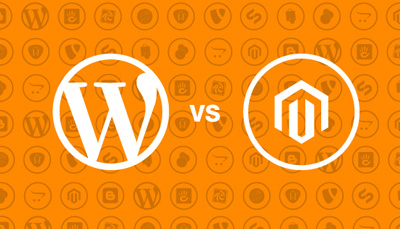With the market flushed with a generous number of e-com platforms to choose from, the decision making becomes all the more harder. And, it only gets worse with each platform offering numerous functionalities that are designed to support and cater to particular e-stores. This can leave you perplexed and in a dilemma, as to which framework to put your finger on.
Like any other business your purpose is to grow over a period of time. Now, what the growth rate is And the consumer base that you are looking to cater to makes a huge difference in your decision making. You might want to have an ecommerce site that is simple in its functionality and then on the other hand you might want to have a platform that supports your growing online business.
Both WordPress and Magento are Content Management Systems offering similar functionality(most of them) to build and setup a highly functional ecommerce store. And since the functionalities/ features are so similar nature it can confuse the retailers as to which platform to choose from.
The easiest way to make a decision is to keep in mind the objective of setting up an online store in the first place.
So, let me break it down for you when I say ‘Objective’.
Now, if you have limited products/ services to offer and you also want to manage content and updates about your organization, then WordPress is better suited for your needs. This is because WordPress is content driven. WordPress is also one of the best blogging platform, so automatically your need to keep your customers abreast with your services and latest news is taken care of.
Also, since WordPress is more content driven, you need to use plugins for incorporating additional features. This can give you additional room for exploring. However, this can also be a cause of concern on account of being less reliable.
Earlier using 3rd party plugins was a risk but with the latest release of WordPress version, most(if not all) of the vulnerabilities have been fixed. However, its always advisable to use any 3rd party plugins with caution(recommendation: use verified 3rd party plugins).
Magento on the other hand handles large product catalogues of ecommerce stores like a charm. If your objective of setting up an online ecommerce store is to just sell products, then using Magento will best fit your needs. Magento helps in forming and setting up a business structure to enable you to sell online.
Now unlike WordPress, Magento has been designed on a platform that is meant to provide solutions specifically for large ecommerce stores. And since it doesn’t need 3rd party plugins to add any functionality, its more secure. Like most typically large online ecommerce stores Magento has built-in options for shopping cart, payment gateway, shipping methods and much more.
Now, Magento as a platform is more extensive than WordPress. What this means is that WordPress is relatively easier to use of the two. But if start using multiple plugins,then getting around WordPress can become a burden. You would need a certain level of expertise to be able to use Magento.
Each platforms have their pros and cons considering How you want to use them. If its content driven with partial selling, then WordPress is your best option. If selling a large no of products is the sole purpose of you setting up an online store, then Magento is the platform for you.
In conclusion, it is the Objective of setting up an ecommerce store that can help you in making a uniformed decision when choosing WordPress or Magento for developing the site.






 Menu
Menu





